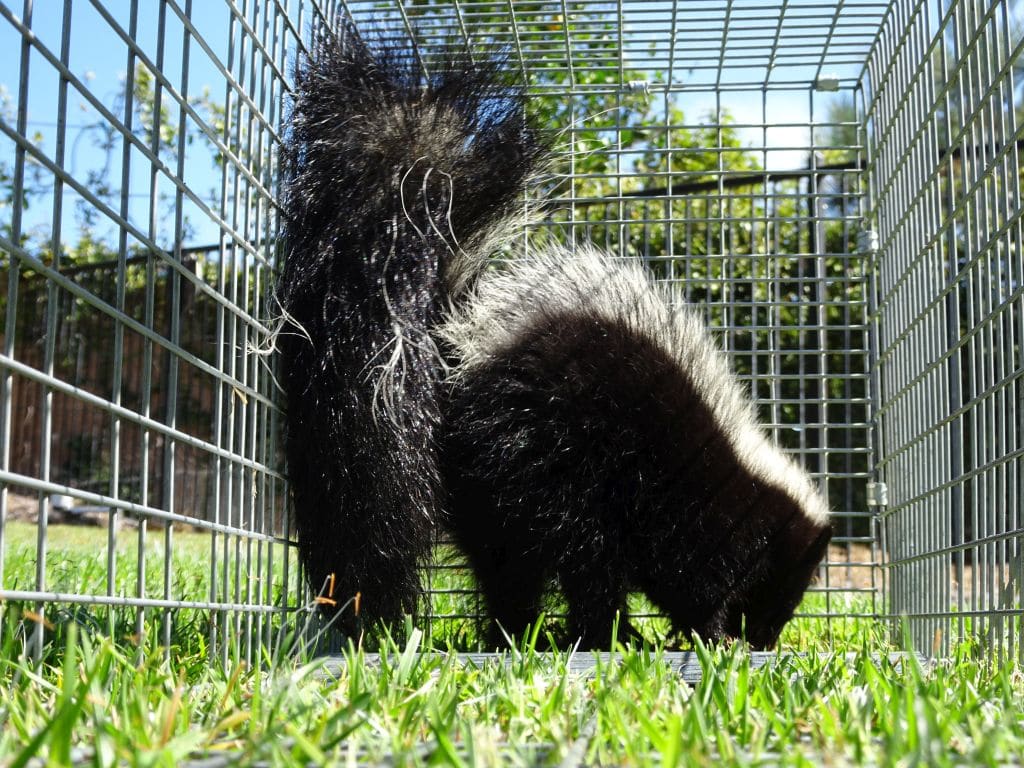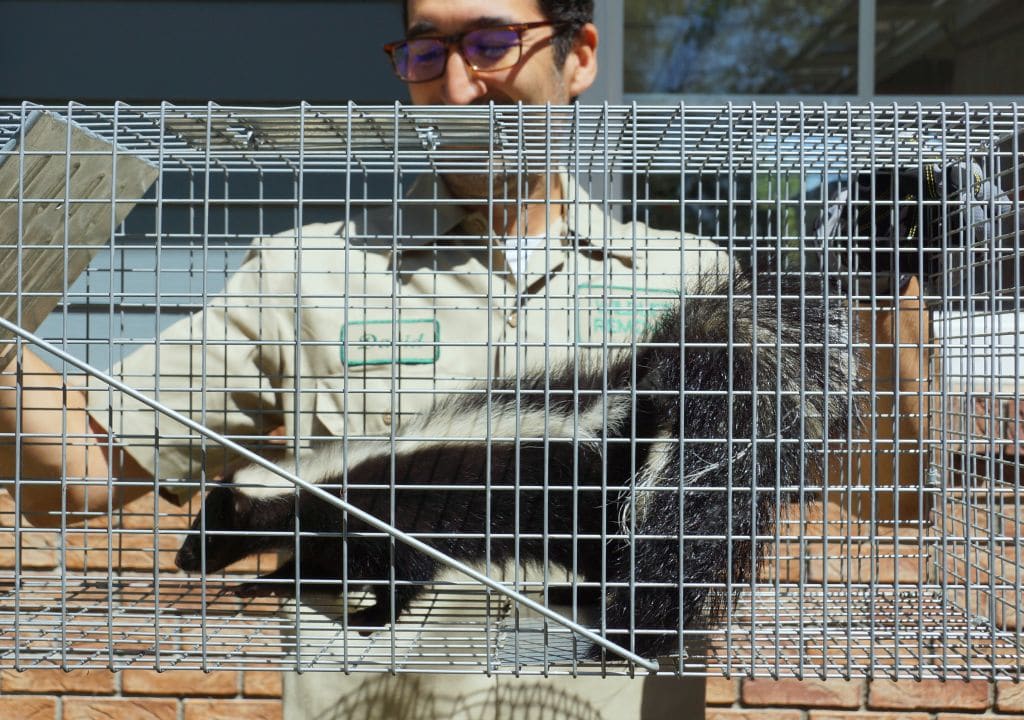Skunks are famous for their foul-smelling spray and distinctive white stripe. But did you know that they are also omnivorous, and dig dens? (Sometimes they’ll do this under your home, deck, or shed, which can cause structural problems and damage pipes).
If you’re looking to ward off or remove a skunk making its home on your property, there are a few methods you can use, including eliminating food and shelter, trapping, and repellents.
First, find out if it’s just the one skunk inspecting the suitability of your home, or if it has already made a den and has a litter. If it’s settled in with kits, you will want to call for professional help.
MAKE YOUR HOME LESS INVITING
If the skunk is still scouting the area, you may be able to deter it from staying.
- Don’t leave any pet food out.
- If you have veggies in your garden, put wire fencing around it (make sure that the wire goes at least a foot underground).
- Keep your garbage sealed with a tight lid; skunks will tear through any bags.
- Install L-footers around the base of your building and fence.
- Keep your grass short; this will minimize the number of insects there are for the skunk to eat.
- If you have chickens, make sure that they have a skunk-proof coop. Skunks will go after the eggs.
SKUNK REPELLENTS
Repellents have varying degrees of effectiveness, so combine them with the other deterrent methods listed above. They also wear off and require regular reapplication, especially after rain.
The most effective repellents include:
- ammonia (soak some cloth in it and lay them around)
- predator urine
- repellent products containing capsaicin (extracted from hot peppers)
Apply these to your yard’s perimeter, any areas the skunk frequents, and the mouth of its den.
TRAPPING SKUNKS
If you can’t deter the skunks using other means, you might have to trap them. However, you should always consult your local state laws first.
- Lethal traps are indiscriminate and will kill whatever they catch. You’ll also have to dispose of the carcass, and skunks smell even worse when dead.
- Live traps allow you to relocate the animal. Cover the trap with a tarp; if the skunk can’t see you, it can’t spray you. If it does spray, the scent will hit the tarp instead.
- Sardines
- Bacon
- Canned tuna
- Peanut butter
- Insect larvae
- Wash the trap first to remove the human scent, and use gloves when setting it.
- Set the trap near their den, or areas they frequent. Skunks are nocturnal, so set the trap in the evening and check it early in the morning.
Once you’ve caught the skunk, you’ll need to relocate it or call a wildlife control agency to take it for you. Check your state regulations before releasing the skunk.
Once you get rid of the skunks, be sure to protect your yard to prevent them from returning or another skunk taking their place.

HOW TO KEEP SKUNKS AWAY
Although skunks are generally mild-mannered, they are best known for their spray attacks. Their spray contains a pungent mix of sulfur-based compounds. A skunk’s odor is unmistakable regardless of whether it’s living in a woodpile or under your house – and it smells terrible, to say the least. Visit skunkpestcontrol.com to learn more about skunks.
But that’s not all. Skunks also dig holes and burrows that disfigure the landscape and weaken the structural integrity of the foundation.
For these reasons, their presence quickly becomes problematic for homeowners. Through our experiences at Precise Exterminating Service Inc, we have found that the best approach for dealing with skunks is to prevent them in the first place.
So, what exactly are some of the ways to keep skunks away?
- Eliminate food sources
Having easily accessible food in your property is an open invitation to these unwanted guests. Skunks are primarily omnivores, eating insects, vegetation, and other small vertebrates. Therefore, you need to cut off the food supply.
Here are some tips to consider:
- Ensure you tie up waste in trash bags before tossing it in the garbage can. But more importantly, keep a lid on outdoor trash cans.
- Deal with any insect infestation you have in your lawn or garden to avoid attracting skunks, which are higher up in the food chain.
- Control the grub population in your lawn and garden. You can introduce beneficial nematodes to eat them up. Alternatively, you can apply an insecticide.
- Do not leave pet food outside, especially at night.
- Remove potential habitats
Just like any other animal, skunks are always on the lookout for a place to call home. But there’s the thing: skunks generally do not build their nest. Instead, they take up residence in abandoned dens.
So here are some things to have in mind:
- Inspect your property to look for signs of nests created by other animals in the past. Then cover them up with gravel.
- Remove brush piles from your yard.
- Make underneath your crawlspaces inaccessible. Why? Because skunks are known to take advantage of the space under the deck, shed, or patio.
- Declutter your yard and garage.
- Ensure that you trim your lawn regularly.
- Repellents
A whole lot of substances are touted as effective skunk repellent. But the truth is that there are no fool-proof ones. The best you can expect is a mild success. Here are some of the most popular skunk repellents.
- Castor oil and dishwater: Mix these substances and spray the mixture around your yard (or in areas frequented by the skunk).
- Ammonia: Soak ammonia in rags and place the soaked rags around your property.
- Essential oils like peppermint oil, lavender oil, and the likes may help keep skunks away.
- Predator urine: Predator urine signifies to skunks that your property is a predator territory. Skunks are then forced to stay away.
- Citrus peels: Skunks are known to hate the scent of orange or lemon peels. Applying these peels to your yard may help keep skunks away.
- Use Deterrents
- Bright lights
Skunks have very sensitive eyes. That’s partly why they are most active at night. By installing bright lights in your yard, you make it uncomfortable for them to invade. Even better is to make use of a motion-activated light. The surprise element is sure to startle the skunk back to the cover of darkness.
- Motion-activated sprinklers
By delivering a jet of water anytime skunk steps on your lawn or property, the animal becomes startled and is compelled to leave.
- Call in the professionals
If you’ve tried all of the above, but you’re still unsuccessful in keeping skunks away, then it’s time to bring in the professionals.
Precise Exterminating Service Inc is a professional wildlife removal company with vast experience in effective skunk removal and control. Contact us today to make your property skunk-free.

HOW TO KEEP SKUNKS OUT OF YOUR GARDEN
Skunks. They may look cute from afar, but unless you want your home and garden reeking of rotten eggs, it’s best to make sure they’re kept far far away from your property. Skunks are extremely adaptable, able to live almost anywhere as long as they have access to food, water, and shelter. They will even move into the abandoned dens of other animals.
With expanding urban areas, a backyard or garden can be a haven for wild skunks. Besides the obvious unwanted smells they bring, skunks can also bring diseases and parasites, so direct contact should be avoided. There are plenty of humane methods to deter skunks from your garden, so let’s take a look at some of the best.
Some of these methods are:
- Keeping it Clean
This one is pretty basic. Keep your garden clean and ensure there isn’t any leftover food. If there are bird feeders, keep them high as skunks aren’t excellent climbers. Also, make sure that your garbage can is securely covered. If your garden has fruits and vegetables, the skunks would be attracted to them. You should take extra precautions, perhaps using nets to cover them.
- Fence it up
If your garden has fruits and vegetables growing, consider setting up a small fence. Now, you may need to fence a couple of inches underground as well because some of the skunks are quite pesky and would dig under your fence. You can sprinkle chili powder or black pepper around the fence for an extra
- Black Pepper
Spray some finely ground black pepper on the ground or crops you want to protect from skunks. A single whiff will make them sneeze convulsively and make sure they maintain a healthy distance from your garden. The black pepper also doesn’t harm the plants in your yard. However, if you have dogs or cats around, they might also get affected by the black pepper. In which case, use an alternative.
- Turn the Tables with the Power of Smell
This one’s pretty ironic since the skunks are usually the smelly ones, but they do hate certain smells. Citrus, ammonia, mothballs, and predator urine (dogs, foxes, coyotes, etc.) are some of the scents that will scare them off. Take precautions if using ammonia-soaked rags or mothballs, and store them in a secure place away from children or pets.
- Keep it lit
Skunks are nocturnal, so naturally, they detest bright lights. An appropriately lit garden or motion-activated lights will keep them off your lawn at night. You can also use this to your advantage in the daytime while looking for any signs of skunk invasion.
What else you can do
Try and find the skunk’s den during daylight hours, you can begin a campaign of humane harassment. They love peanut butter, so you can use that as bait. If you find a den or a hole, you can make sure whether a skunk is living there or not by throwing some flour or cornstarch down there. You can also fill the hole with dirt when it’s not around.
However, if it has babies in there, you might want to hold out on that thought; otherwise, you might wind up hurting them. You can also simply call a professional to take care of the skunk or its babies as well. And with that, you, your house, and your little ones would be pretty safe from skunks and their smells.
